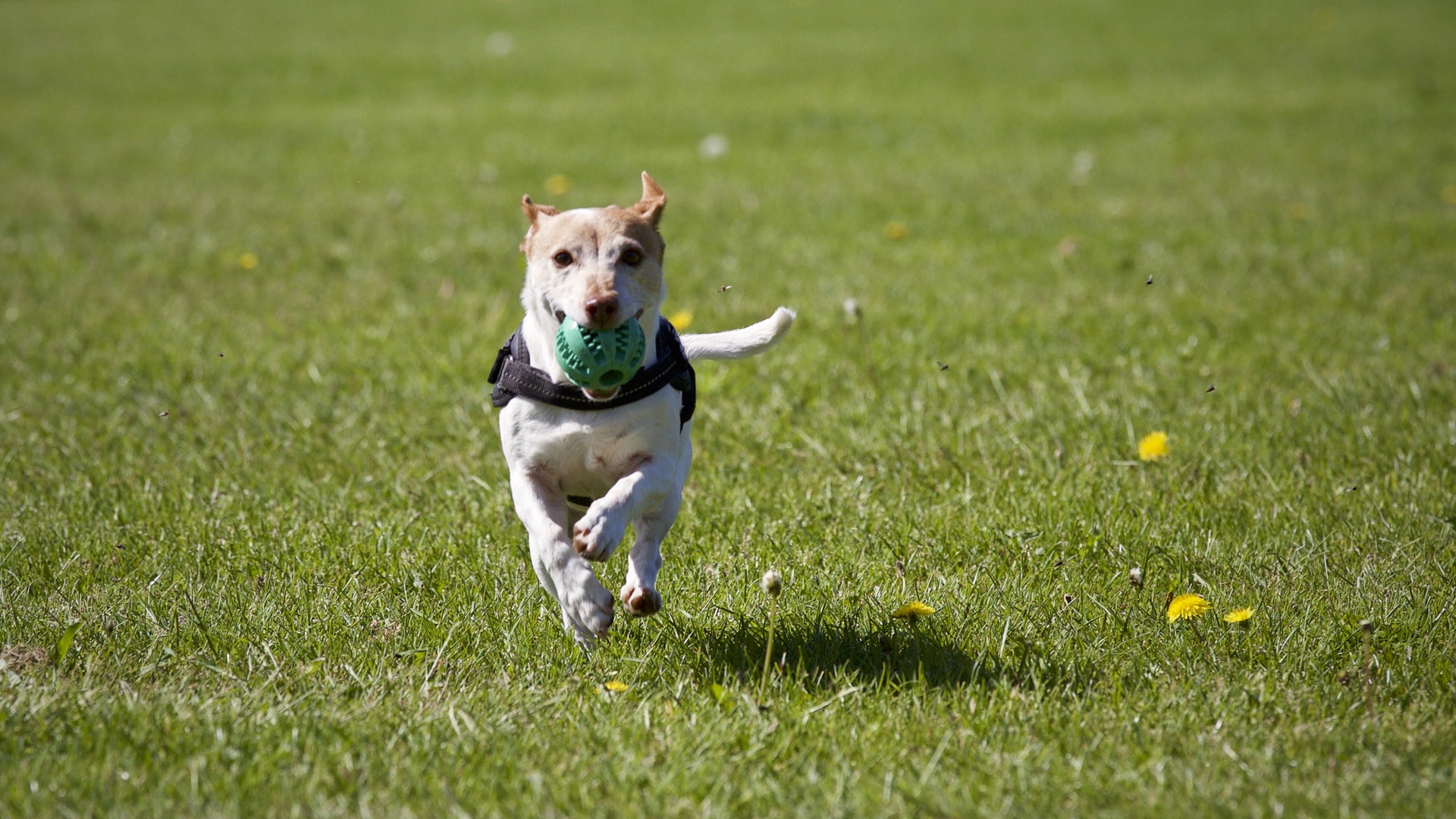If you’re sat at home googling “Why is my dog barking at nothing?” with ever-increasing desperation then I feel for you, as do all of the other owners who can’t seem to figure out how to stop their dogs incessant barking.
Now, the reality is that dogs are always going to bark for one reason or another. It’s one of the many ways they communicate and tell us what’s going on.
- If there’s an intruder lurking in the backyard they’ll bark to give you fair warning.
- If the neighbor’s dog is giving them the evil eye they’ll bark to assert their dominance.
But what happens when there’s no apparent cause for your dog’s obsessive barking?
What do you do when a 2-hour barking fit starts with no explanation?
Well, fret not because in today’s blog post, I’m going to be really off an extensive list of all the potential reasons for this increasingly frustrating behavior. Along with a few tried and tested methods so you can ultimately…
- Figure out why your dog is barking.
- Put in place an effective plan of action to address it.
But before we get into the do’s and don’ts of stopping your dog’s obsessive barking, I’d highly recommend checking out the short video below from Dan Abdelnoor over at The Online Dog Trainer. (see video below)
Even if you think you’ve got all your bases covered, the training techniques Dan demonstrates are a sure-fire way to quickly teach your dog how to be calm and in control of their emotions.
The end result?
…A dog that thinks twice before turning into a raging bark-aholic.
Anyway, here’s the video link to take a look: Click Here To Discover How To Finally Solve Your Dogs Frustrating, Unwanted Barking Habit… Even If You’ve Tried & Failed Before!
(video will open in a new window)
Understanding The Reasons Your Dog Could Be Barking
The first thing to consider is that some breeds of dog are simply more vocal than others.
For example, most greyhounds tend to be very quiet whereas Yorkie Terriers are famously ‘yappy’.
You should also consider that dogs have their own personalities and some may just happen to be more vocal than others.
In the worst-case scenario, it may occur spontaneously at any time of day or night, causing considerable stress and frustration which can test the patience of even the most loving owner.
And while barking can become problematic when it is unnaturally excessive. Dog Behaviorists agree that there is always a distinct reason why dogs tend to bark including…
- Alarm barking
- Territorial barking
- Greeting barking
- Social barking
- Attention barking
- Separation barking
- Frustration barking
- Illness barking
We’ll throw in one more – compulsive barking.
In this case, the dog will tend to bark while also performing a repetitive action such as walking up and down a fence or staircase.
Most commonly seen in rescue dogs or those who have been otherwise poorly socialized.
It rare, and most veterinarians will suggest absolutely ruling out any other possible cause first.
But often the only solution in such cases is extensive training and even medication.
So before we get in too deep with this one, let’s focus instead on addressing the most common causes before more extreme situations (no matter how frustrating the barking may be!).
Related Post: How To Calm An Overexcited Dog – Instant Calming Techniques

Why Is My Dog Barking At Nothing?
Now we understand the emotional reasons why dogs may bark excessively it’s time to take a look at some common examples.
Remember that there can be a combination of factors which are causing your dog distress and that from our perspective it may be something seemingly normal or inconsequential.
So before you jump to conclusions, try and put yourself in your dog’s ‘shoes’ and see which of the following may be a source of the problem.
Barking When Left Alone
Many owners are surprised when a neighbor knocks on their door to complain about their dog barking when left alone.
It is common for dogs left indoors to bark a ‘welcome home’ greeting when they hear you put your key in the lock, but many owners assume their dog just naps when they are out and about.
Unfortunately, this isn’t always the case.
Some dogs will bark incessantly when left alone, while others will be ‘set off’ by an unexpected noise (mailman, car horns, etc).
Separation anxiety is a common problem and one that tends to especially affect dogs that are traditionally used to packs (huskies, greyhounds etc).
It can be a very difficult habit to break with dogs that are used to being in constant company.
Barking Due To Fear
A scared dog is going to bark.
While in the case of separation anxiety the fear is simple to understand, there can be many more reasons they can feel so vulnerable.
Dogs are incredibly perceptive and sensitive to their environment and atmosphere.
For whatever reason, they may simply just not like some places.
Alternatively, it could be something as simple as the buzz from a refrigerator, the rumble from distant road traffic, or just people walking by.
Addressing barking caused by fear can be difficult at the best of times.
And most professional advice is based around trying everything you can to help make your dog feel at ease.
Treats and cuddles are going to help of course, but you may wish to consider other changes such as letting your dog sleep in the bedroom, leaving a radio or TV on low, providing plenty of toys, and leaving curtains/blinds closed when going out.
Barking & Warning
Excitable dogs will tend to bark whenever they hear or see something out of the ordinary.
After all, from their perspective, it may be a threat and therefore they are being a good ‘pack player’ by raising the alarm.
While it is unfair to become cross at this behavior, it’s completely understandable.
I know how frustrating when your dog barks because he’s heard something hundreds of yards away that has nothing to do with you or your property!
Even worse, if the noise source is consistent, your dog will probably start barking at regular intervals throughout the day.
Effectively addressing this tends to involve some kind of training.
Associating quietness and placidity with a regular supply of treats is one solution, but may not be ideal and much depends on the nature and source of the noise.
If it is caused by another dog barking, then it is wise to consult the experts and take action as soon as possible to try and prevent it from becoming a nasty habit.
Dog Driving You Barking Mad? Click Here To Discover How To Finally Solve Your Dogs Frustrating, Unwanted Barking Habit… Even If You’ve Tried & Failed Before!

Barking Because Of Boredom
Even if your dog is fine being left alone while you are at work, you can be sure that they will be craving some attention when you come home.
And difficult as it may be after a long day, it is essential to make time for your dog and try to keep to a regular schedule so they have something to look forward to.
A lack of exercise and/or play is going to make some dogs very stressed out and consequently much more liable to bouts of spontaneous barking.
And chances are that dogs who seem to be barking just to be a nuisance are actually trying to tell you that they want some attention and exercise!
Obviously, you will need some free time for yourself so even just letting them out into the yard/garden (if suitable) as soon as you get home.
Just try to avoid the easy solution such as providing lots of treats as this may make matters much worse.
Excited Barking
Hey, your dog is happy to see you!
This is fine but this can become a problem when they simply refuse to stop.
Some breeds are naturally more energetic and excitable than others, and while that can be great fun the same is rarely said for the accompanying barking.
It can be difficult to remain patient and avoid the urge to forcefully tell them to be quiet.
Especially if they’re just happy to see you.
But the last thing you want to do is encourage this type of behavior or even worse, react to it in a positive way.
Instead, the best trick to at least reduce this is to stop everything, stand still and be quiet.
When they stop barking, hold the silence for as long as feels appropriate (30 seconds is good), then reward with a treat and a cuddle.
If this doesn’t work then it may be time to consider obedience training.
Painful Barking
If your otherwise peaceful dog suddenly starts to bark much more than usual then never rule out the option of pain or illness.
Just because there may be no obvious signs does not mean there is not a problem of some kind.
Try and keep an eye on when the barking fits are taking place.
Is your dog sitting down, running or lying on a particular side when he starts to bark?
Is it before or after mealtimes?
Dogs are just like us in the sense that they will contract occasional short term conditions that will naturally pass.
However, if the barking continues and there is no other apparent reason it is likely that a trip to the vet is going to be necessary.
Related Post: My Dog Barks At Everything – How To Quite A Noisy Dog

How To Stop Excessive Barking?
You are the pack leader so what you say goes.
The problem is that nobody has yet invented a way for humans and dogs to communicate effectively.
So instead you have to lead by example and use other prompts to try and reduce the unnecessary barking for good.
In most cases following these steps will solve the problem.
#1 – Effective Correcting Behavior
Simply tell your dog to stop barking.
Do so calmly and without raising your voice, and adopt a tall yet non-aggressive posture while holding your eye contact.
Usually, this will cause the dog to stop barking but keep an eye on their body language.
Maintain that silent position until the tension has noticeably left their body.
You’ll know when they are calm because their back and tail will relax and ideally, they will sit or lay down.
When they have adopted a passive posture their brain will have calmed down. Reward with a treat.
Chances are that if there is a persistent cause for the barking that it will resume again shortly.
All you can do is repeat the same practice until your dog accepts that peace and quiet will be rewarded.
#2 – Keep Calm When Correcting
Your dog will copy your energy.
So if you lose it an start shouting and screaming they will assume that you are also stressed by what is troubling them.
And if you continue, all your doing is communicating that not only do you agree with them but that you are unable to do anything about it.
Obviously, this is the worst possible action to take!
So what should you do?
Speak gently and softly to your dog and ask them to stop barking.
Repeating ‘don’t be scared’ or words to this effect in a low tone over and again until the barking stops will assure them that there is nothing to worry about.
Once he’s calm simply return to whatever you were doing and act like all is well in the world.
Your dog will notice.
#3 – Trust Your Dog’s Perception
Dogs are experts in reading body language.
One trick used by many experts who help train particularly aggressive dogs is to up their body into a ‘scarecrow’ posture with their arms held out in the 7 o’clock position and palms facing forward.
Compared to a stressed out and loudly barking dog, such a passive position will send a signal that you are not scared and nor should they be.
This technique will also serve to reinforce your position as the pack leader.
Over time, these physical cues can be further developed to encourage discipline and calm with easily panicked dogs.
Dog Driving You Crazy? Click Here To Discover How To Finally Solve Your Dogs Frustrating, Unwanted Barking Habit… Even If You’ve Tried & Failed Before!

#4 – Keep Them Active & Stimulated
Generally speaking, dogs which are around the home most of the time tend to be those more prone to spontaneous barking fits.
On the other hand, those who are frequently exposed to changes in scenery, environment, and people to interact with are often less prone to panic-induced barking.
Keeping your dog stimulated or even doing something as simple as varying daily walking routes can be enough to significantly reduce their barking.
Also factor in the amount of exercise typically required by breed.
Some dogs naturally require much more than others, and if out during the day consider looking into a daytime walking service as well.
#5 – If None Of This Works…
In many cases addressing the points above will over time, help your dog feel calmer and less inclined to barking fits around the house.
However, if absolutely everything else has been exhausted and still the problem persists it may be time to consult an expert.
Good behaviorists will have encountered this problem many times and have enough experience to find the source of problems that can often be missed
Final Thoughts
As we have seen there are many factors that may be causing your dog to bark at seemingly ‘nothing’.
But the truth is, there is always a reason why dogs bark.
So it’s your job as leader of the pack to figure this out and try and remedy it.
Don’t worry if that sounds daunting as most of the time barking issues can be effectively resolved without resorting to specialist services.
As a final note, do not ever consider using bark collars or other restrictive devices.
Even those which claim to be ‘pain-free’ are still restricting your dog’s ability to express themselves and do nothing but cause them distress.
Nobody wants a silently distressed pet, and chances are they will have to resort to more destructive behavior to communicate their fears.
What have you tried to stop your dog barking at nothing? Let me know in the comments below…

